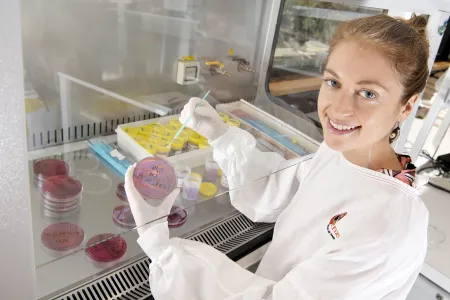News Article
Melioidosis research traces source to reduce spread
Research by a Charles Darwin University PhD graduate, who tracked the source of the melioidosis-causing bacterium, could help develop future public health measures in communities prone to infection.
The research through the Menzies School of Health Research by the newly graduated Dr Audrey Rachlin focused on the environmental bacterium Burkholderia pseudomallei, which causes melioidosis.
Dr Rachlin said the tropical infection was endemic in Northern Australia and Southeast Asia with 38 confirmed cases in the Northern Territory this year so far.
Originally from the USA, Dr Rachlin began working on melioidosis during her Masters research project with the London School of Hygiene and Tropical Medicine, where she travelled to Laos in Southeast Asia to study the infection.
“During my time in Laos I saw many melioidosis patients first-hand and became aware of the heavy burden of disease and high rate of mortality there, which has been as high as 40-50% of patients in the past,” she said.
Inspired to continue her research, she decided to enrol in a PhD with CDU and work with Menzies, who are renowned globally for melioidosis research.
“The aim of my PhD research was to examine soil and surface run-off in Darwin, Northern Australia and Vientiane, Laos, which are two urban endemic settings, to examine the distribution and local spread of B. pseudomallei,” she said.
“Using whole-genome sequencing I was able to demonstrate that some molecular types are more widespread and established in the environment, while others are highly spatially clustered over a small geographic area.
“The high rate of detection and diversity at drain sites in Darwin and Laos also suggested that drains likely play a role in dispersal of B. pseudomallei in the environment, particularly during periods of heavy rainfall.”
She said that improved awareness of the local population structure of the bacterium in Darwin has also enabled the successful investigation of two melioidosis case clusters in captive zoo animals.
“Knowledge gained from my research will allow for better understanding of B. pseudomallei phylogeography and source attribution, which may help to develop future public health measures throughout endemic areas,” Dr Rachlin said.
Since completing her studies, Dr Rachlin has been working as a research officer in the melioidosis team at Menzies, along with other epidemiology and public health projects.
“Completing my PhD has been both rewarding and empowering and I feel as though I have contributed something significant to melioidosis research and this sector of public health,” she said.
“I hope to continue working in the global public health and infectious disease epidemiology sectors in the future.”
Related Articles

First “hype cycle” of AI development put tech above humans
Users around the world have rushed to adopt artificial intelligence - especially in safety-critical fields - but a new study has revealed the hype has prioritised technology for technology’s sake instead of human-centred development.
Read more about First “hype cycle” of AI development put tech above humans
Nanoplastics hindering cognitive abilities of fish, international research shows
Nanoplastic exposure can impair the cognitive abilities of fish and could lead to significant impacts on marine species’ ability to survive, according to a new international study.
Read more about Nanoplastics hindering cognitive abilities of fish, international research shows
New project to grow Indigenous aquaculture on one of Australia’s largest islands
An Australian island’s efforts to improve food security and transition into a blue economy will be bolstered by a new project to propagate a nutritious and increasingly popular fish.
Read more about New project to grow Indigenous aquaculture on one of Australia’s largest islands
